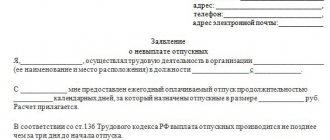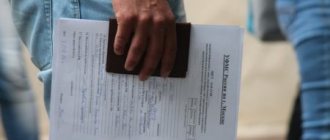Registration rules for a foreigner
There is a limited time available for registration of foreigners. For those arriving from other countries and planning to reside in the Russian Federation for some time or on a permanent basis, a period of 7 calendar days is provided for the purpose of registration. It is carried out at the place of actual residence or temporary stay. For violation of the current registration rules, the legislation of the Russian Federation provides for administrative liability. A fine for failure to register a foreign citizen is the most common punishment.
To register, you must contact the appropriate department of the territorial Department of Internal Affairs of the Ministry of Internal Affairs of the locality in which the foreigner is expected to reside. The registration procedure is carried out by the receiving party. In this capacity has the right to act:
- a citizen of the Russian Federation registering a foreigner in a residential premises belonging to him;
- a legal entity hiring a foreigner;
- a legal entity that has accepted a foreigner for a period of temporary stay. These are the owners (or representatives of the owners) of hotel complexes, medical institutions, etc.;
- a foreigner who is the owner of housing in the Russian Federation and resides permanently in Russia.
To register, fill out a form for registration of a foreign citizen. Documents submitted along with the application form are a migration card and a foreigner’s passport. Depending on who exactly acts as the host, a housing lease agreement or other necessary documents may be required in addition to those already listed.
questionnaires (.PDF)
Quota for temporary residence permit
Those wishing to live in the Russian Federation for a long time submit papers to obtain a temporary residence permit. You should know that each subject of the Russian Federation can annually issue a certain number of quotas for temporary stay/residence. The number of quotas for each subject is individual and approved by the government.
If all quotas have been exhausted, local FMS authorities will not accept an application for issuing a temporary residence permit. The quota rule does not apply to all foreign citizens. Regardless of the availability of quotas, applications from:
- Citizens who were born and lived on the territory of the USSR or the Russian Federation.
- Persons who have a disabled parent who is a Russian citizen.
- Persons who are recognized as disabled if they have able-bodied children who are citizens of the Russian Federation.
- Citizens who have made large financial investments (the amount is set by the government).
- Persons who entered military service.
- Participants in programs for the resettlement of compatriots and members of their families.
- Foreigners who are legally married to citizens of the Russian Federation.
Children who have not reached 18 years of age receive the right to GRP, regardless of the presence of a quota, if permission is received by their parents. Children who have reached the age of 18 but are incompetent receive a temporary residence permit at the request of a parent.
Duration of stay according to law
If a foreigner is a citizen of a country with which Russia has a visa regime, then the period of his stay on the territory of our country is determined by the validity period of his visa. For citizens of states with a visa-free regime with the Russian Federation, they (stay periods) are 90 days out of every 180 days. Accordingly, in both cases, when registering a foreigner, we must talk about temporary registration. An exception to this rule is permanent “registration” in residential premises, to the use of which a foreign citizen has a confirmed right.
Overdue registration is grounds for bringing a foreigner to administrative liability. There are various ways to check the authenticity of a temporary registration. Thus, a foreign citizen can be interviewed by representatives of the relevant services in person, and his data can be checked at the Main Directorate for Migration of the Ministry of Internal Affairs of the Russian Federation. If necessary, the authorities resort to surveys of owners of housing in which a foreigner is registered, to checking the foreigner’s rental document, etc.
Accommodation is not local
How is it punished for foreign citizens to live outside their place of registration?
The foreigner must live at the address where he was registered with the Federal Migration Service. Otherwise, he will also be prosecuted under Article 18.8 of the Code of Administrative Offenses, which punishes all offenses related to non-compliance with the rules for registering foreign citizens.
The problem is that the freedom of movement of any person within the territory of the Russian Federation is enshrined at the constitutional level. Consequently, a foreigner is not obliged to permanently reside at the address where he was registered with the Federal Migration Service.
He can visit friends or relatives, he can go to another locality for several days, and so on. In short, it is very difficult to impose a penalty on the circumstances in question.
Especially in a situation where a person is ready to defend his innocence in court and has the time and means to do so.
Late penalty amount
The amount of the fine for violation of registration deadlines by foreign citizens is prescribed in the Code of Administrative Offenses (Article 18). After the latest changes adopted in the relevant legislation, for foreign violators the amount is 2-5 thousand rubles. In regional centers, Moscow, St. Petersburg, as well as in Sevastopol, the fine can reach 5-7 thousand rubles. A repeated violation recorded within 1 year will entail the imposition of a new fine of up to 7 thousand rubles.
Depending on the severity of the violation, a foreign citizen, in addition to imposing a fine, may be subject to other punishment. This, according to Russian legislation, is considered expulsion from Russia or deportation with a subsequent ban on entry into the country. The period of time covered by such a sanction can be up to 5 years.
Host Responsibility
In accordance with current legislation, the receiving party also bears its share of responsibility. A fine for late registration of a foreign citizen is the first and most common method of punishment for violations of this kind. Other ways are:
- correctional labor for individuals;
- suspension of activities for legal entities.
The amount of fines that can be imposed for late registration of a foreigner in the Russian Federation or other violations related to this procedure for individuals is 2-4 thousand rubles. For officials, the fine for a similar violation will be much higher - 35-70 thousand rubles. For violations in the registration of foreign citizens, a legal entity will have to transfer 0.4-1 million rubles to the state.
Responsibility
In the Code of Administrative Offenses, in Chapter 18, violation by a foreign person (regardless of citizenship) of the rules of entry into Russia, the regime of stay or residence and the procedure for establishing places for this, rules for recording migration, movement within the territory, transit passage through the territory, and also failure to fulfill the obligation to notify about confirmation of residence - in these cases an administrative fine of 2,000 to 5,000 rubles is imposed.
The same liability is provided for in the absence of documents establishing the right to reside or be located on the territory of Russia, as well as the fact of loss of these documents in case of failure to submit a statement of loss, as well as evasion of leaving the country upon completion of the established period, if these actions cannot be part of the criminal offense.
Failure to comply with the stated purpose (upon entry into Russia) of the activity and occupation that is actually carried out during the period of stay or residence implies an administrative fine of no more than 5,000 rubles.
All of the above actions of the violator, if they were committed in Moscow, Sevastopol or St. Petersburg and in the regions (federal cities), will entail a fine of 5,000 to 7,000 rubles.
A repeated administrative offense within one year is punishable by a fine of up to 7,000 rubles.
Possible deportation from the Russian Federation is provided for all cases described above.
The expulsion of a foreign person is carried out as control of the independent departure of the offender and does not apply to persons who are subject to administrative liability.
Deportation is an exceptional measure. It consists of both control over the expulsion of the offender and the imposition of an obligation to leave within a certain period at his own expense. Applies to persons who repeatedly violate migration rules, as well as to those who have been in the country for a long time without registration.
When donating an apartment to a close relative, the latter does not have to pay tax (13%).
The assignment of land lease rights is carried out only with the consent of the land owner (private person or state). You will learn how to carry out this procedure as quickly and easily as possible from our article.
Do you need to conclude a short-term land lease agreement for 11 months? All the nuances that you may encounter during this procedure are described here.
How to avoid punishment
It is not simple. But in some situations, you can defend your rightness or, at a minimum, by accepting the fact of the imposed punishment, you can then restore your rights. It is necessary to try to achieve this, since if you get on the “black list” of the migration department, you can lose the right to stay in Russia in the future.
If a foreigner finds himself in a situation where he is physically unable to contact the UVM in a timely manner to renew his registration, he must try to collect documents certifying this fact. Having managed to confirm with their help that the delay in registration occurred for valid reasons, he will be able to avoid imposing a fine or other punishment.
Another question is how one can renew the registration of a foreign citizen when such documents are missing. In such a situation, you will need to urgently leave the Russian Federation (until your current registration expires) and return to the country again, after waiting 90 days. Then the violation will not be recorded.
Advice from a lawyer on how to avoid a fine for lack of temporary registration: Video
If a document is lost
If you lose documents (except your passport) required for migration registration, you must immediately contact the Migration Department of the Ministry of Internal Affairs. If your passport is lost/stolen, you should first contact the police. To restore any documents, you will have to write a corresponding application. Under some circumstances, a foreigner may be required to additionally provide other documents. There are no penalties for restoring lost documents.
What to do if you are late?
Not all immigrants deliberately violate registration procedures. This often happens due to inattention or forgetfulness of the person. Sometimes a person may have serious reasons for missing legal deadlines.
Attention! To avoid trouble with a fine or prevent deportation from the country, you can leave the country for 90 days and then return back. This will allow the person to re-register.
The Migration Service very closely monitors foreigners who have arrived for a long period of time. All that is required of them is registration of permanent registration and compliance with state laws.
If any violations are detected on the part of a citizen of another country, appropriate punishment will be applied to him.
The next stage is obtaining a temporary residence permit
Obtaining a temporary residence permit is the first stage if the ultimate goal is to obtain Russian citizenship. Therefore, it is advisable to extend the permission received for the first time by contacting the relevant department of the Ministry of Internal Affairs of the Ministry of Internal Affairs. If this is not done, then after 3 years the previously issued temporary residence permit will lose legal force.
To obtain a temporary residence permit, you need to collect a package of documents established by law. Papers in any foreign language must be translated into Russian and notarized. When drawing up an application, it is important to enter your personal information as accurately as possible. An application for a temporary residence permit is made on a territorial basis, i.e. in the region in which the foreigner intends to reside in the future.
Validation check
How to check with the Federal Migration Service whether a foreign citizen has registered? Despite the active development of services for remote provision of data in electronic form, there is not yet a service on the FMS website where one could find out about the authenticity of a foreigner’s registration.
To obtain the necessary information, an interested person can contact the relevant territorial department by telephone.
An employee may refuse to provide such information, citing the protection of personal information .
If official information is needed, then only a written request remains, which will indicate the reason for requesting information .
Find out how to register a foreign citizen at his place of residence using a temporary residence permit on our website.
Validity period of the received document
After registration, a detachable part of the application is issued, which is used by the foreigner as confirmation of his legal presence in the country. This document is valid only for three months. It is possible to extend its validity period, for which you must contact the Ministry of Internal Affairs again.
If a foreigner has overstayed his temporary registration because he did not renew the document, he will have to pay a fine. If a person does not know whether his registration is valid, he can check it at the department of the Ministry of Internal Affairs or at the Federal Migration Service.
What does it mean to “register a car”
What is this. Each car has individual tags by which it can be recognized by a traffic police officer, a diagnostic center and a camera. Such labels by law include:
- individual body, chassis or frame number (VIN) - a stamp that is placed at the factory;
- registration certificate, or PTS - prepared by the manufacturer, it comes complete with the car;
- state registration plates, or numbers. They are issued at the registration department of the traffic police;
- registration certificate (CTC) - issued by the traffic police.
When a traffic police officer registers a car, he enters all this data into a special database - the register of vehicles. And the driver is given STS, numbers and supplements the PTS.
Deadline for vehicle registration. The driver has 10 days from purchasing the car to register it. The date of purchase is indicated in the purchase and sale agreement. It doesn’t matter whether the car was purchased at a showroom or secondhand.
How much does it cost to register a car? If the car is new, the traffic police issues signs, STS and makes an entry in the PTS. For all this, the driver pays a state fee:
| The traffic police issues | price, rub. |
| license plate, 2 pcs. | 2000 |
| STS | 500 |
| change in PTS | 350 |
| Total | 2850 |
If you register a used car, then registration marks are not needed - they will be passed on to you from the previous owner. All that remains is to pay only 850 rubles for the issuance of a new STS and changes to the PTS.
Why is registration needed? If a driver in a new car without registration breaks the rules, for example, drives drunk, hits a pedestrian and flees the scene of the accident, it will be difficult to hold him accountable. Traffic cameras read the number plate, but it won’t be on such a car.
How to defer registration. The law does not provide for this.
How to check if a car is registered. Go to the verification page on the traffic police website and enter the VIN of the car in the field at the top of the page. This number can be found in the STS or PTS of the car.
The driver prepares such a package of documents when registering the car
When can you drive without registering your car with the traffic police?
10 days from the date of purchase. As long as this period has not passed since the date of purchase, there will be no fine. See the purchase and sale agreement for the date of purchase.
During the validity period of transit numbers. Transit numbers are temporary. They are assigned to cars to be driven from one region to another or abroad. Such numbers are valid for up to 30 days.
Along with transit signs, the traffic police issues the vehicle owner with a note indicating that the car has been deregistered.
The yellow color of the region cell means that the numbers are transit
Where should I go?
The body that deals with the extension of temporary registration is the Federal Migration Service branch at your place of residence . A citizen who is a foreigner and lives in the country on a work visa can apply there.
Citizens of our country can apply for an extension of temporary registration both at the FMS office and at the passport office at their place of residence.
We tell you more about where foreigners apply for temporary registration and where Russian citizens register in this material.
You can contact these authorities by making a personal appointment, as well as using the government services website. Name profile on the portal you can easily find the one you need in the list of services offered and order it.
You will receive a notification about the time to appear at the FMS office or the passport office, and they will also tell you what documents you need to collect for this , and will also answer questions, for example, whether registration is necessary if you have a patent.
What are the consequences of lack of registration or late registration?
Lack of registration, as well as expired registration, are recognized at the legislative level as non-compliance with the current norms of Russian legislation. It is quite natural that in this situation the violator will be held accountable. Most often, penalties in the form of monetary deductions are applied to the violator as punishment.
It is worth noting that the specific amount of the fine will directly depend on the circumstances that prompted the citizen to break the law, on the specific region, the severity of the offense, as well as on the violator himself - an individual or a law firm.
In our other article you can find out in more detail what the fine is for lack of registration. ⇐
Who has the right to do this?
Who has the right to renew registration? Of course, these are citizens of our country who live outside their place of permanent residence and, for objective reasons, cannot leave it.
This is due to work or study, and in some cases, treatment in medical institutions.
In addition, foreign citizens may also apply for an extension of temporary registration for a number of reasons listed in the paragraphs above.
Machines and officials
At this stage, the various penalties do not end. We have studied the fine for overdue registration at the place of residence, as well as for late vehicle registration for individuals and companies. There are several other important points in the chosen area.
If the official did not register the car on time, he will also need to pay for the violation. Practice shows that the transaction will be less than what legal entities pay, but more than what individuals pay. This is quite normal Russian practice.
An official must pay 2-3.5 thousand rubles for failure to register a vehicle. As in previous cases, much will depend on the specific situation. The exact amount of payments will be determined on an individual basis.
How much to pay
After government authorities carry out an appropriate inspection and identify the fact of a violation and the lack of registration of a person at his place of residence or long-term stay, a protocol will be drawn up with which violators must be familiarized. Next, the amount of the fine and the time frame within which it must be paid and registration must be completed.
In each region, the amount of fines differs from each other, but on average you can focus on the following indicators:
- From 2 to 7 thousand rubles for an unregistered person and the same amount for the owner of a residential premises who did not promptly submit information about the citizen living with him to the migration service;
- From 25 to 50 thousand rubles fine for officials;
- From 250 to 800 thousand rubles for legal entities and organizations that have not registered citizens;
- From 2 thousand rubles and criminal liability for the owner of a residential premises who has issued a fictitious registration.
To avoid liability:
- It is necessary to document the close relationship between the owner of the property and an unregistered person living on its territory;
- Provide registration in the same locality, but at a different address.









